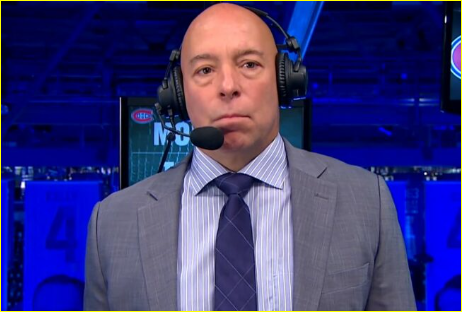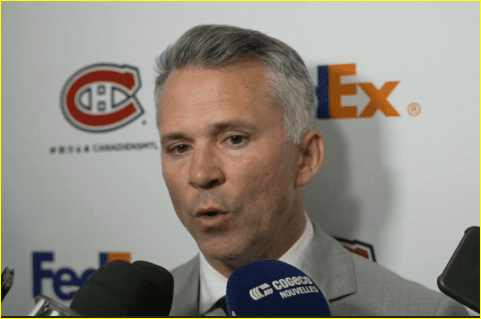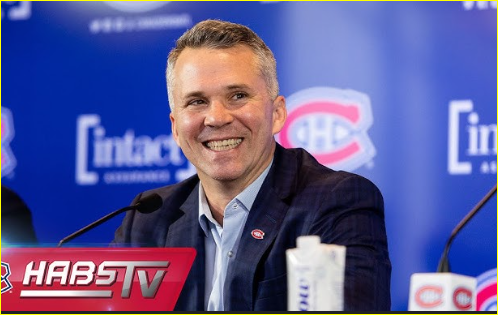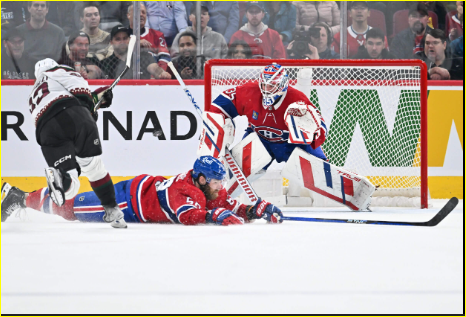The possibility of the Canadiens trading Arber Xhekaj is a divisive one. Xhekaj, a physical, rugged defenseman with a unique skill set, has become something of a fan favorite in Montreal. His aggressive playstyle and willingness to defend teammates have endeared him to fans, and he brings an edge that’s hard to find in today’s NHL. Trading a player like Xhekaj could indeed be risky, especially since the Canadiens are still in the rebuilding phase and he’s the type of player who can solidify the blue line both physically and mentally.
For Kent Hughes, balancing the current needs with the future vision for the team has been at the core of his tenure so far. Some of his deals, like trading Tyler Toffoli and Ben Chiarot, have been met with mixed reviews, while others, like acquiring assets for Brett Kulak and drafting Lane Hutson, have shown a sharp eye for long-term growth. The Sean Monahan acquisition stands out as an impressive reclamation project, yielding dividends both in Monahan’s play and potential future trade value.

However, Xhekaj’s value lies in his uniqueness. His combination of grit, skill, and physicality makes him stand out in a league that increasingly prioritizes speed and skill. Trading him could leave a hole in the Canadiens’ defense that would be hard to replace, not just in terms of physicality but also in terms of locker-room presence and on-ice protection. The question Hughes has to consider is whether the return for Xhekaj would significantly push the rebuild forward or if he’s better off keeping Xhekaj as a long-term piece who can develop alongside the team’s young core.
The best path forward might involve patience. Xhekaj is still developing, and his ceiling is not fully clear. If Hughes decides to trade him, it would likely have to be for a substantial return that includes either a top-tier prospect or high draft picks that align with the Canadiens’ timeline. Otherwise, moving on from such a rare type of defenseman might prove to be a costly mistake, especially if Xhekaj blossoms into a cornerstone player elsewhere.
The fact that Arber Xhekaj would generate a bidding war if he were available underscores just how unique and valuable he is. Darren Dreger’s point about double-digit teams being interested is telling; it’s rare for a defenseman to combine his physicality with offensive potential, and Xhekaj’s age only adds to his appeal. At 23, he’s still developing and could become a staple in Montreal’s lineup for years, potentially maturing into a consistent, high-impact top-four defenseman.
For Kent Hughes, this presents a complex decision. Testing the market could reveal just how much value other teams are willing to part with, potentially offering the Canadiens assets that might advance their rebuild. However, Hughes would have to be sure that the return would significantly outweigh the potential loss. Xhekaj’s physicality brings an edge that complements Montreal’s young, skilled core, and his offensive upside adds versatility to his game. Montreal has struggled at times to develop and keep impactful defensemen, so letting a rare player like Xhekaj go could be seen as short-sighted if he realizes his potential elsewhere.
Ultimately, it would make sense for Hughes to be cautious. Unless a deal comes along that’s too good to pass up—think high draft picks or a high-end prospect—keeping Xhekaj might be wiser. His combination of grit, size, and emerging skill is rare in today’s NHL, and Montreal may regret letting go of a player who could become a cornerstone of their blue line.
Trading Xhekaj Comes With Risks for the Canadiens
The fan perspective here captures the heart of the dilemma for the Canadiens: trading a unique asset like Arber Xhekaj could create a void in their lineup that would be difficult to fill. Xhekaj’s combination of size, toughness, and emerging skill brings an edge to the Canadiens’ defense that few players offer, and replacing his presence wouldn’t be easy. Trading him would likely mean losing a rare element—one that many fans and teams recognize as difficult to find in today’s NHL.
While there may be considerable interest from teams across the league, the potential return is a big concern. If the Canadiens are only likely to receive a mid-tier prospect or later-round pick, it hardly justifies moving on from a player with Xhekaj’s unique skill set and potential upside. His value to the Canadiens isn’t just about what he brings today; it’s also about what he could develop into with continued support and time to hone his game.
Hughes would need to be confident that moving Xhekaj is part of a broader strategy that supports the Canadiens’ long-term vision. Trading him just for the sake of change or because of his current inconsistencies could be a decision Montreal regrets, particularly if Xhekaj goes on to excel in a role where his physicality and skills are maximized.



